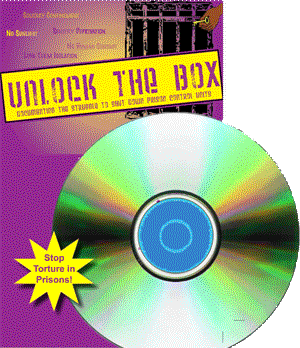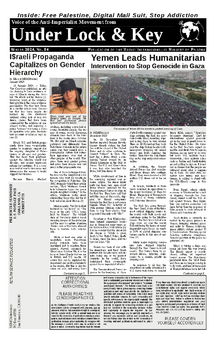
Unlock the Box movie previews at StopMax
 MIM(Prisons) interviewed Reel Soldier, who previewed a new film they are working on at the StopMax conference in Philadelphia in May.
MIM(Prisons) interviewed Reel Soldier, who previewed a new film they are working on at the StopMax conference in Philadelphia in May.
MIM(Prisons): What was the purpose of the conference?
Well, the StopMax campaign mission reads, "Our mission is to promote and support a national movement to end the use of solitary confinement and related forms of torture in US prisons." And i think it did a very good job of that with the conference. It brought together an impressive group of organizations and people that have been doing work around the issue of isolation and prison torture.
MIMP: So your film fit in well with the theme of the conference. Can you tell us a little about the film?
Yeah, it was really good timing for us. The film is called Unlock the Box, and it is all about the history of and the struggle against the use of long-term isolation in u$ prisons. It is very clear about the emergence of control units (and large-scale incarceration in general) as a form of political repression. If you look at the history of penitentiaries and more severe forms of isolation, it was largely determined to be a failed experiment over a century ago. But with the effective end of Jim Crow and other overt forms of white power, and the national liberation struggles that emerged from that struggle, prisons and isolation become an important tool for controlling the oppressed populations within u$ borders.
So it gets into some history. We also have some factual information on what control units are including new research some comrades have put together on the number and extent of long-term isolation. We think we have the best numbers out there right now, and they're a lot higher than the usual 25,000 that people have been citing for some years. We're seeing upwards of 100,000 people in long-term isolation. But this research is ongoing because it is so hard to get complete statistics, and a number of groups at the conference are collaborating to share this information. The plan is to publish the stats on [url=http://www.abolishcontrolunits.org]www.abolishcontrolunits.org soon, where you can also get information on the movie and how to order the DVD.
MIMP: What led you to create this film? What do you hope to accomplish with it?
The film came out of work that some of us were doing with the United Front to Abolish the SHU, which was a collection of organizations in California working together to build the campaign there. After doing a conference in 2005 by the same name, some of our public work died out and some of us changed focus for various reasons. But it seemed like a good time to sum up and document what had been years of work in California, and we knew of others, including MIM, who were carrying out similar campaigns across the country. In addition, we had felt we had put enough energy into petitioning the legislature to shut down the SHU, and that our window of influence there had closed with little success. We did have success in reaching the public and bringing light to an issue that is very hidden from the public eye though. And the movie was an idea to continue public opinion work in another format.
MIMP: What did people at the conference think of the film? Did you get any useful feedback to help shape the final version?
The response was great. I have to give props to the American Friends Service Committee (AFSC) for bringing together so many people who were so involved in this issue. The audience couldn't have been more catered to the movie. Unfortunately, we only had a rough draft done at that point, but people still felt it was very moving and on point. I was actually even a little surprised, because the film gives a pretty radical analysis of the international connections with the war on terror, the war on gangs, and the role of the amerikan oppressor nation in supporting this torture. And yet, everyone that responded seemed to really like the message and the content of the movie.
As far as feedback, the main thing was probably the suggestions of things that we should add to the film. And with all the great resources at the conference we were able to gather a lot of material to incorporate some of those suggestions. We don't claim to have a comprehensive coverage of the struggle everywhere, but we've got a lot of good examples, and a lot of information packed in to this movie. We got one suggestion to add more persynal stories to win people over on that level, which we have done. Our preview focused on some of the more theoretical material that we wanted to get across for that forum. And a couple of us that have been involved in the film production itself used the opportunity to look at the technical aspects and overall flow in a little more critical light. Just having an audience in the room with you allows you to say, "man, this part is too long" or "that visual just looks cheesy" when just a day ago you're sitting in front of the computer and you can't imagine cutting anything out or changing something.
MIMP: What were the key accomplishments of the conference?
Well, for us it was a huge accomplishment to get a preview of our movie on the screen. If it wasn't for this conference who knows where this project would be now. It really pushed us to get something on disc. I mean i was literally compressing the movie and burning it to disc for the first time less than 24 hours before our presentation. So we got to expose people to the film and we got lots of pre-orders for the DVD. This is important, because at this point we don't have a distributor so we're just going to do one big mass mailing when it comes out in September. So people need to send in their orders now to get one.
But the conference as a whole really seemed to solidify for the first time, what many of us have been striving for for years, a national campaign to oppose control units. The AFSC has stepped up to play the role of providing infrastructure to promote continued communication and collaboration between different parties working around this campaign.
So, it seems like the campaign has reached a critical mass of a sort. And it may be good timing in regards to how many states are re-evaluating their tough-on-crime laws and prison-building crazes.
MIMP: How will attendees be working to carry the struggle forward?
That's a good question. People were really enthusiastic about working together. But we will see how that plays out. Sharing information is always good, so that should help all of us if that continues effectively. But, as we learned with the United Front to Abolish the SHU, it is sometimes hard to bring a lot organizations together when politics are very different. We had some experiences where it seemed that sectarianism seemed to prevent groups who were nominally working on the same issues from joining the United Front, or causing them to leave. And it's clear that some groups have different approaches stemming from their different politics. Which shouldn't necessarily be a problem, since a United Front has room for many different political lines and strategies.
There is a question of whether some strategies or political interests within the movement are somewhat antagonistic though. For example, there is a strong focus on getting the mentally ill out of SHU, which in our analysis usually plays into the states goal of using the SHU as a tool of political repression. This has become the standard because it works. But by works, i mean that they can get the laws passed, but it doesn't necessarily translate into less people being in SHU, just different populations - generally populations that are or potentially would pose political challenges to the white power structure. So this could be a net setback.
Some state campaigns have been successful in actually getting the numbers in SHU decreased legislatively. In contrast, court challenges to the SHU as a whole have been ineffective, only having limited successes in regards to specific conditions or to the mentally ill.
New legislative campaigns are well under way in places like Arizona and Illinois, and likely to spread. Others were more focused on the need to organizing prisoners, street organizations and the oppressed nations in general. Hopefully these two major focuses can complement each other as the campaign advances.
MIMP: How can people who are interested in this struggle get involved with the film or the United Front?
Well, this movie has been largely inspired by the work MIM and now MIM(Prisons) has been doing. And our analysis in the film is along those lines. Which puts us more in the camp of focusing on the organizing of prisoners and by extension street organizations. In fact, i've been talking to a number of comrades in this process about a second film that focuses on the lumpen on the street. But i think one of the lessons you can take from the movie is that control units are a response to a powerful movement of the oppressed, that included a strong prison movement. By prison movement, i mean prisoners organizing on the inside. We don't really see anything like that today, though the possibility exists.
So people on the inside need to make that happen. We need strong cadre organizations with a real analysis and political line to back up these more reformist oriented campaigns that some of the outside organizations are focusing on. And since the nature of prisons and control units is to prevent that from happening, we need people on the outside to provide the infrastructure to help make that happen. I'd point to MIM(Prisons) political books to prisoners program and study programs as important to developing cadre level comrades behind bars. As the movie points out in the conclusion, this is what we need to put an end to the pointless violence that is going on in there right now and to create a system that serves the people. And of course, we've got to work to keep people out of the SHU.
As far as getting involved with the film, we just need to get it out there at this point. Check out the website to order a DVD. And any indie distributors or online stores out there should email the contact there if they are interested in making this thing generally available in the future. If you're on the outside and interested in joining this campaign a good first step would be hosting a showing of this film in your area. You can usually get a free space at the library or local college or church. We will probably post some promo materials online at some point for people to use. And if you are gonna do a showing send them an email and they will promote it on the website, we've actually already had a few groups host other showings of the preview we put out.
I mean, i assume anyone who's reading this is gonna be hip to MIM(Prisons), so that's where i'd look for specific info on campaigns that need your support. And there are a lot of other groups out there working on this issue you might support as well. But i'd encourage people to think seriously about what the best strategy is to actually achieve our goals (and before that you might need to define what your goals are). That is what we are striving for constantly, and i hope this film helps us all consolidate our thoughts around that question.








